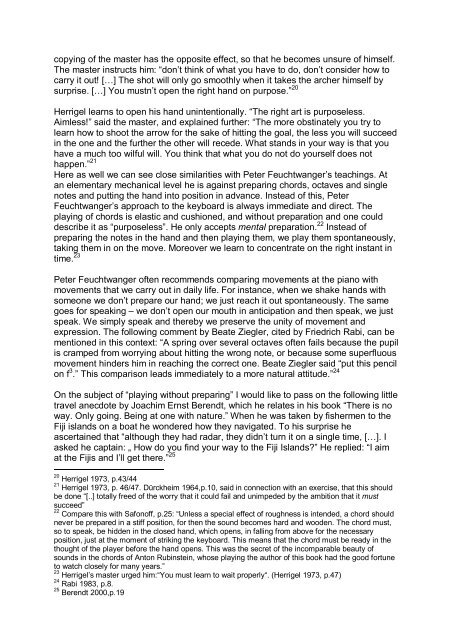Zen in the art of playing the piano - Peter Feuchtwanger
Zen in the art of playing the piano - Peter Feuchtwanger
Zen in the art of playing the piano - Peter Feuchtwanger
Create successful ePaper yourself
Turn your PDF publications into a flip-book with our unique Google optimized e-Paper software.
copy<strong>in</strong>g <strong>of</strong> <strong>the</strong> master has <strong>the</strong> opposite effect, so that he becomes unsure <strong>of</strong> himself.<br />
The master <strong>in</strong>structs him: dont th<strong>in</strong>k <strong>of</strong> what you have to do, dont consider how to<br />
carry it out! [ ] The shot will only go smoothly when it takes <strong>the</strong> archer himself by<br />
surprise. [ ] You mustnt open <strong>the</strong> right hand on purpose. 20<br />
Herrigel learns to open his hand un<strong>in</strong>tentionally. The right <strong>art</strong> is purposeless.<br />
Aimless! said <strong>the</strong> master, and expla<strong>in</strong>ed fur<strong>the</strong>r: The more obst<strong>in</strong>ately you try to<br />
learn how to shoot <strong>the</strong> arrow for <strong>the</strong> sake <strong>of</strong> hitt<strong>in</strong>g <strong>the</strong> goal, <strong>the</strong> less you will succeed<br />
<strong>in</strong> <strong>the</strong> one and <strong>the</strong> fur<strong>the</strong>r <strong>the</strong> o<strong>the</strong>r will recede. What stands <strong>in</strong> your way is that you<br />
have a much too wilful will. You th<strong>in</strong>k that what you do not do yourself does not<br />
happen. 21<br />
Here as well we can see close similarities with <strong>Peter</strong> <strong>Feuchtwanger</strong>s teach<strong>in</strong>gs. At<br />
an elementary mechanical level he is aga<strong>in</strong>st prepar<strong>in</strong>g chords, octaves and s<strong>in</strong>gle<br />
notes and putt<strong>in</strong>g <strong>the</strong> hand <strong>in</strong>to position <strong>in</strong> advance. Instead <strong>of</strong> this, <strong>Peter</strong><br />
<strong>Feuchtwanger</strong>s approach to <strong>the</strong> keyboard is always immediate and direct. The<br />
play<strong>in</strong>g <strong>of</strong> chords is elastic and cushioned, and without preparation and one could<br />
describe it as purposeless. He only accepts mental preparation. 22 Instead <strong>of</strong><br />
prepar<strong>in</strong>g <strong>the</strong> notes <strong>in</strong> <strong>the</strong> hand and <strong>the</strong>n play<strong>in</strong>g <strong>the</strong>m, we play <strong>the</strong>m spontaneously,<br />
tak<strong>in</strong>g <strong>the</strong>m <strong>in</strong> on <strong>the</strong> move. Moreover we learn to concentrate on <strong>the</strong> right <strong>in</strong>stant <strong>in</strong><br />
time. 23<br />
<strong>Peter</strong> <strong>Feuchtwanger</strong> <strong>of</strong>ten recommends compar<strong>in</strong>g movements at <strong>the</strong> <strong>piano</strong> with<br />
movements that we carry out <strong>in</strong> daily life. For <strong>in</strong>stance, when we shake hands with<br />
someone we dont prepare our hand; we just reach it out spontaneously. The same<br />
goes for speak<strong>in</strong>g we dont open our mouth <strong>in</strong> anticipation and <strong>the</strong>n speak, we just<br />
speak. We simply speak and <strong>the</strong>reby we preserve <strong>the</strong> unity <strong>of</strong> movement and<br />
expression. The follow<strong>in</strong>g comment by Beate Ziegler, cited by Friedrich Rabi, can be<br />
mentioned <strong>in</strong> this context: A spr<strong>in</strong>g over several octaves <strong>of</strong>ten fails because <strong>the</strong> pupil<br />
is cramped from worry<strong>in</strong>g about hitt<strong>in</strong>g <strong>the</strong> wrong note, or because some superfluous<br />
movement h<strong>in</strong>ders him <strong>in</strong> reach<strong>in</strong>g <strong>the</strong> correct one. Beate Ziegler said put this pencil<br />
on f 3 .This comparison leads immediately to a more natural attitude. 24<br />
On <strong>the</strong> subject <strong>of</strong> play<strong>in</strong>g without prepar<strong>in</strong>gI would like to pass on <strong>the</strong> follow<strong>in</strong>g little<br />
travel anecdote by Joachim Ernst Berendt, which he relates <strong>in</strong> his book There is no<br />
way. Only go<strong>in</strong>g. Be<strong>in</strong>g at one with nature.When he was taken by fishermen to <strong>the</strong><br />
Fiji islands on a boat he wondered how <strong>the</strong>y navigated. To his surprise he<br />
ascerta<strong>in</strong>ed that although <strong>the</strong>y had radar, <strong>the</strong>y didnt turn it on a s<strong>in</strong>gle time, [ ]. I<br />
asked he capta<strong>in</strong>: How do you f<strong>in</strong>d your way to <strong>the</strong> Fiji Islands?He replied: I aim<br />
at <strong>the</strong> Fijis and Ill get <strong>the</strong>re. 25<br />
20 Herrigel 1973, p.43/44<br />
21 Herrigel 1973, p. 46/47. Dürckheim 1964,p.10, said <strong>in</strong> connection with an exercise, that this should<br />
be done [..] totally freed <strong>of</strong> <strong>the</strong> worry that it could fail and unimpeded by <strong>the</strong> ambition that it must<br />
succeed<br />
22 Compare this with Safon<strong>of</strong>f, p.25: Unless a special effect <strong>of</strong> roughness is <strong>in</strong>tended, a chord should<br />
never be prepared <strong>in</strong> a stiff position, for <strong>the</strong>n <strong>the</strong> sound becomes hard and wooden. The chord must,<br />
so to speak, be hidden <strong>in</strong> <strong>the</strong> closed hand, which opens, <strong>in</strong> fall<strong>in</strong>g from above for <strong>the</strong> necessary<br />
position, just at <strong>the</strong> moment <strong>of</strong> strik<strong>in</strong>g <strong>the</strong> keyboard. This means that <strong>the</strong> chord must be ready <strong>in</strong> <strong>the</strong><br />
thought <strong>of</strong> <strong>the</strong> player before <strong>the</strong> hand opens. This was <strong>the</strong> secret <strong>of</strong> <strong>the</strong> <strong>in</strong>comparable beauty <strong>of</strong><br />
sounds <strong>in</strong> <strong>the</strong> chords <strong>of</strong> Anton Rub<strong>in</strong>ste<strong>in</strong>, whose play<strong>in</strong>g <strong>the</strong> author <strong>of</strong> this book had <strong>the</strong> good fortune<br />
to watch closely for many years.<br />
23 Herrigels master urged him:You must learn to wait properly. (Herrigel 1973, p.47)<br />
24 Rabi 1983, p.8.<br />
25 Berendt 2000,p.19



